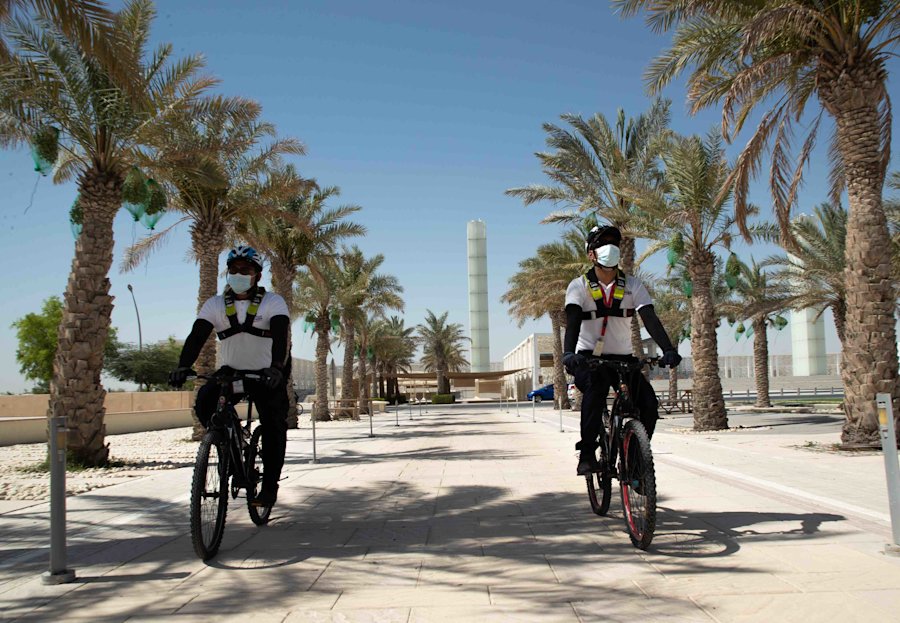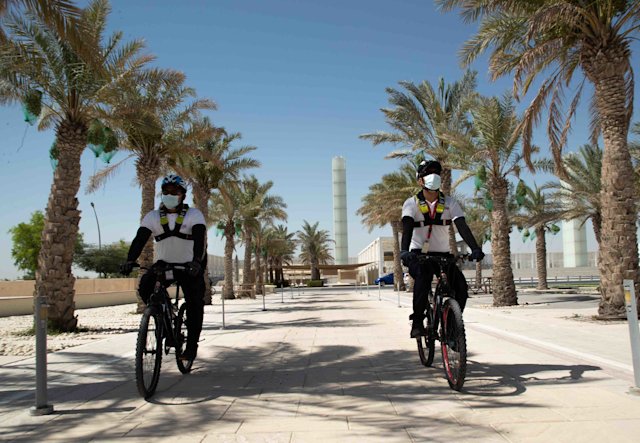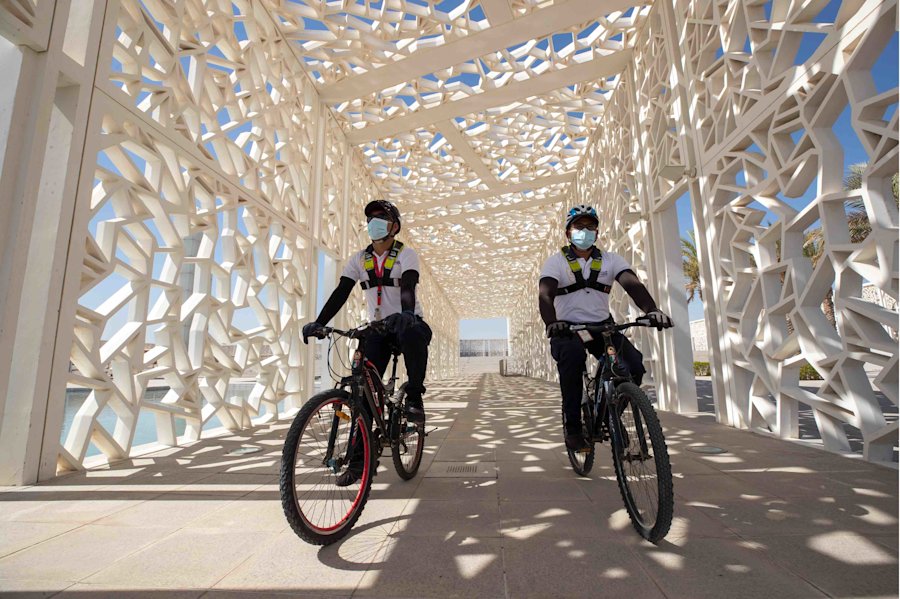Coronavirus (COVID-19) Updates
For the latest COVID-19 information and updates from Qatar Foundation, please visit our Statements page

As Summer Working Hour Regulations go into effect, Qatar Foundation looks at heat stress mitigation on Education City campus
It’s 10am and the outdoor temperature is reaching 44 degrees Celsius as Ricky Marquez finishes his morning round of the Education City campus on his security bicycle. Equipped with a helmet, sunglasses, and hydration backpack, he’s nonetheless soaking through with sweat after a short ride between campus buildings.
With longer afternoon breaks, and shaded rest areas between our patrols, we’re avoiding too much heat exposure
“This heat is really a killer. I’m from the Philippines, and I’ve never felt heat like this. There, the maximum temperature only goes up to about 32 degrees. Here, the extreme heat and humidity make even 30 minutes of outdoor cycling tough to handle. But I understand that it’s the nature of my job, so I’m glad for new safety measures as summer gets hotter.
“Since last month we’ve been given more flexible rotations, a buddy system to make sure we look out for each other, and enough cold water throughout the day. With longer afternoon breaks, and shaded rest areas between our patrols, we’re avoiding too much heat exposure,” says the security guard.

Bicycle security are among the outdoor staff facing the highest heat stress levels, managing heat with reduced outdoor work, and greater rest and hydration periods.
Qatar’s Ministry of Administrative Development, Labour & Social Affairs (ADLSA) announced a new legislation for the Summertime Working Hours as part of the state’s continuous labor reform efforts. From June 1 to September 15, outdoor working is prohibited between the hours of 10am to 3.30pm, and a raft of new measures are in place to protect workers and reduce heat stress.
Heat stress regulations were introduced to the Gulf countries starting in the middle of the last decade and have been continually refined and updated in the period since. The first Summer Working Hours regulations went into effect in Qatar in 2007, making it among the earliest adopters in the region, and while it’s a leader in heat stress standards, there is still work to be done.
“In 2017, Human Rights Watch issued a report on heat stress in the Gulf that brought needed attention to the impact of extreme heat and humidity on workers,” says Dr. Rajai (Ray) Jureidini, Professor of Migration, Human Rights, and Ethics at Qatar Foundation’s (QF’s) Hamad Bin Khalifa University. “That study broke ground in recommending standards that are now used widely, such as the Wet-Bulb Globe Temperature measure for heat stress.”
In a subsequent large-scale study commissioned by the International Labour Organization, the Supreme Committee for Delivery and Legacy, and the Qatar ADLSA, researchers found that despite considerable variability across different jobs, worksites, and work shifts, the overall exposure to heat stress remains high, and mitigation strategies are not used consistently. A combined strategy of shifting work to evening hours, maximal hydration strategies, and a self-work pace can help to ease heat stress conditions, but research shows that abuses continue and up to 30 percent of workers are arriving at worksites already dehydrated.


The new Summer Working Hours guidelines are moving us in the right direction
“The new Summer Working Hours guidelines are moving us in the right direction,” says Dr. Nandakumar Pillai, QF’s HS&E Primary Healthcare Occupational Health Manager. “The improved ADSLA mandate creates a stronger regimen for compliance taking into consideration these three key elements: the worker, the work, and the environment. Heat exhaustion is totally preventable, so we adopt three strategies - clothing strategy, hydration strategy, and empowerment strategy. We need to have clear and enforceable checklists to protect the workers on Education City campus to ensure that culture change happens at the level of all worksites, including the deployment of a “No Water Bottle, No Work” policy for all workers.”
Meanwhile on QF’s Education City campus, hundreds of workers are gearing up for the heat, attending safety sessions and sharing their concerns about how the summer working hours will take effect.

Hundreds of Education City workers in valet parking, landscaping, security, and other manual and craft workers face summer heat stress.
“As we reach the summer season, our Workers Welfare department begin working with our contractors to organize workshops and training sessions, intensifying awareness on heat stress and precautionary measures,” said Stephen Brigg, Executive Director of QF Health, Safety and Environment. “Qatar Foundation doesn’t only employ directly, but we have many contractors and subcontractors that we require to follow our Workers Welfare Standards and Summer Working Hours Guidelines. The best way for us to ensure proper understanding and attention to compliance is by getting right into their organizations and helping to train and build a workers’ safety mindset.”
“All Qatar Foundation contractors are expected to conduct heat stress management risk assessments, move to flexible self-monitored working hours, adjust shift rotations, enforce regular breaks, and monitor the heat index accordingly,” added Brigg. “I’m confident that we can ensure compliance within our Education City Campus but am constantly reminded of the nationwide challenge when I see road and landscaping crews just outside of our doors working in more difficult conditions.”


The best way for us to ensure proper understanding and attention to compliance is by getting right into their organizations and helping to train and build a workers’ safety mindset
Rondell Jay Boulos, QF Workers Welfare Specialist explained that a number of significant heat stress prevention measures are being implemented by contractors, “Under QF HSE advisory, contractors have begun adjusting work timings and rotating many outdoor workers to evening shifts, while daytime workers are being placed in ventilated and shaded areas with sufficient drinking water. Wherever we can,” he says, “our guidance has been to err on the side of comfort and safety, reducing exposure to the increasing summer heat and humidity.”
Back on his bike patrol, Ricky is grateful for the new measures but knows there’s a long summer ahead. “I’m part of the Emergency Response Bike Patrol Team so if there is any health and safety incident in the area, it’s my duty to respond. I have to take care of myself so I can take care of others. The new regulations make it easier, but I still can’t say that I’m looking forward to the summer! Keeping our cool is going to be a challenge for all of us."

